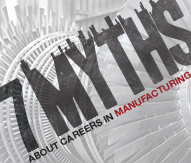7 Myths About Careers in Manufacturing & What To Do About Them
 Finding qualified CNC machine operators and other manufacturing personnel today can be challenging and raises questions about future workforce availability. One solution, of course, is to work with local schools to encourage students to consider a career in manufacturing and point them toward appropriate educational opportunities.
Finding qualified CNC machine operators and other manufacturing personnel today can be challenging and raises questions about future workforce availability. One solution, of course, is to work with local schools to encourage students to consider a career in manufacturing and point them toward appropriate educational opportunities.
Unfortunately, many young people are dissuaded by a stereotypical view of manufacturing as an undesirable career option because they have very little understanding of how much the industry has changed over the years.
Here are 7 myths heard by human resource professionals when they discuss manufacturing with students, and some simple answers to set the record straight.
- Manufacturing is a dirty and dangerous job. Today’s modern factories go to great lengths to maintain neat, clean and safe workplaces. Air filtration devices including oil mist collectors help keep the air free of contaminants, while automated work cell safety enclosures keep workers out of harms way. Heavy lifting is handled by robotic arms, overhead cranes or motorized conveying systems, and machine tools are ergonomically designed to protect worker health.
- Operating machine tools is a mindless job. In truth, operating CNC machine tools requires, among other things, math skills, learning how to program machine controls, understanding Computer Aided Design & Manufacturing (CAD/CAM) software and the ability to think through a machining process to determine the most efficient way to produce a part.
- Nobody manufacturers in the U.S. anymore. In fact, American manufacturing is alive and well, having rebounded from the 2008 “Great Recession.” Gardner Research projects that manufacturers will spend over $7 billion on machine tools in 2014. Additionally, many companies that moved manufacturing to China, Mexico and other countries are now part of the “reshoring” trend that is bringing this work back to the U.S.
- I don’t want to be stuck in a factory all day. Truth is, there are many careers in manufacturing that don’t involve operating machine tools. Service technicians visit customer factories to install, maintain or repair machinery. Applications engineers experiment with various approaches to making parts and products to optimize the processes. While sales engineers help customers solve manufacturing problems.
- There are very few jobs in American manufacturing. According to the U.S. Bureau of Labor Statistics, over 12 million people were employed in manufacturing jobs as of December 2013. Even more significant is that, according to CBS news, manufacturing companies report that there are over 500,000 unfilled positions available in manufacturing. People with the skills, work ethic and willingness to learn are in demand.
- Manufacturing jobs are dead ends. Many manufacturing companies believe in promoting from within and establishing career paths for those who want to advance. That’s how Mary T. Barra, daughter of a factory worker and herself a 30-year General Motors employee, rose steadily in the company to become its CEO in December 2013.
- You can’t get a manufacturing job unless you have experience. While experienced machinists and others are, indeed, in demand, many manufacturing companies welcome entry-level employees from technical schools, community colleges and engineering programs. Some have internship programs, apprenticeships and offer reimbursement for additional education.
Myths, like these, are roadblocks to the industry’s efforts to build the next generation of manufacturing professionals. The best way to dispel these myths is to reach out to high school, college and technical schools to bring students a realistic picture of the advantages of a manufacturing career.